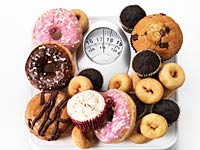Lose Weight > Weight Loss Tips > Weight Loss Articles > Weight Loss Facts - Hope For The Overweight And Obese
Weight Loss Facts - Hope For The Overweight And Obese
It takes a long time to become overweight and it may take a long time to become thin again.
Trying to lose too much too fast can result in a shock to your systems. This approach typically has short term effects and can result in serious health issues.
Excess weight usually comes in 2 forms, retained fluids and body fat. To successfully lose extra pounds requires that you address both of these areas.
Healthy diet and exercise are only part of a successful weight loss program. Knowledge and planning are much more important than dieting and exercise alone.
There is hope for overweight people. They can take small, achievable steps to improve their health and reach their ideal weight. Overweight refers to an excess of body weight, but not necessarily body fat. Obesity means an excessively high proportion of body fat. Health professionals use a measurement called body mass index (BMI) to classify an adult's weight as healthy, overweight, or obese. BMI describes body weight relative to height and is correlated with total body fat content in most adults.
To get your approximate BMI, multiply your weight in pounds by 703, then divide the result by your height in inches, and divide that result by your height in inches a second time. A BMI from 18.5 up to 25 is considered in the healthy range, from 25 up to 30 is overweight, and 30 or higher is obese. Generally, the higher a person's BMI, the greater the risk for health problems, according to the National Heart, Lung and Blood Institute (NHLBI).
Setting a realistic goal is the first step to weight reduction. By using a BMI chart and consulting with your health care provider, you can determine what your ideal weight is. Studies show that you can improve your health with just a small amount of weight loss. "We know that physical activity in combination with reduced calorie consumption can lead to the 5 to 10 percent weight loss necessary to achieve remission of the obesity-associated complications," says William Dietz, M.D., Ph.D., director of the Division of Nutrition and Physical Activity at the CDC. "Even these moderate weight losses can improve blood pressure and help control diabetes and high cholesterol in obese or overweight adults."
To reach your goal safely, plan to lose weight gradually. One-half to two pounds a week is usually safe, according to the Dietary Guidelines for Americans 2000. This can be achieved by decreasing the calories eaten or increasing the calories used by 250 to 1,000 calories per day, depending on current calorie intake. (Some people with serious health problems due to obesity may lose weight more rapidly.) If you plan to lose more than 15 to 20 pounds, have any health problems, or take medication on a regular basis, see your health care professional before you begin a weight-loss program.
Your doctor might advice you to restrict your diet prescribe regular exercise. Even though this is a good idea, many people still choose pills. They fear that restricting diet and regular exercise will not help. Which may be true for some. Calorie restricted diets without proper nutrition can lead to constant hunger, resulting in a weight gain rebound. Sadly, exercise alone burns little fat calories. Exercise combined with a healthy diet does promote weight loss. As Tom Venuto a famous body builder says you should "burn the fat and feed the muscle."
You need to be wary of many weight loss pills on the market today. "There is no magic pill for obesity," says David Orloff, M.D., director of the FDA's Division of Metabolic and Endocrine Drug Products. "The best effect you're going to get is with a concerted long-term regimen of diet and exercise. If you choose to take a drug along with this effort, it may provide additional help."
Prescription weight-loss drugs are approved only for those with a BMI of 30 and above, or 27 and above if they have other risk factors, such as high blood pressure or diabetes. People should contact a doctor before using any kind of drug, including a weight-loss drug, claims the U.S. Food and Drug Administration.
The best way to lose excess fluids is to give your body what it wants, enough fluid to keep your body hydrated. If you drink enough water to keep your body hydrated it won't need to store any excess fluids. Health professionals recommend drinking up to 8-16oz. glasses of water per day. While decreasing excess fluids is part of losing weight. The body stores excess fluids to prevent dehydration. By keeping your body hydrated it will shed the stored fluids.
Water is nature's own cleansing fluid. Drinking a lot of water will have a cleansing effect on your bodily systems. As your body cleans out the excess fluids it will also clean out toxins that are stored in fat cells.
Related Articles
-
Seven Tips To Ensure You Dont Fall Off The Wagon With Your Weight This FALL Season
As the leaves drop, the rain sprinkles, and the trees change color, yo
-
Diet Plans For Babies
“The history of diet plan dated from the moment that the first monke
-
Fat Burning Furnace - The Easy Diet with Powerful Breakthrough Techniques!
Fat Burning Furnace - The Easy Diet with Powerful Breakthrough Techniq
-
Weight Loss The Sensible Way
Weight Loss The Sensible Way Finding an easy weight loss program shoul
-
The Negative Calorie Diet - Can This Be Real?
You have probably heard of the Negative Calorie Diet, sometimes referr
-
How to Start Losing Weight and Keep Losing Weight
I have put off writing a motivation article because
- DON'T MISS
- Is Phen375 The Right Supplement For Your Weight Loss
- Weight Loss Information and Advice
- Fast Way To Lose Weight Lose Fat Fast Tips
- Lose Weight Easy with the HCG Weight Loss Program
- For Some A Weight Loss Patch Is A Good Option
- The Simple Golf Swing System By David Nevogt
- Burn fat in Your Thighs - How To Guide
- Eat Stop Eat Results-Eat Stop Eat Review
- What Is The Fat Burning Furnace Program
- Easy Weight Reducing Tips - Tips For Reducing Belly Fat




